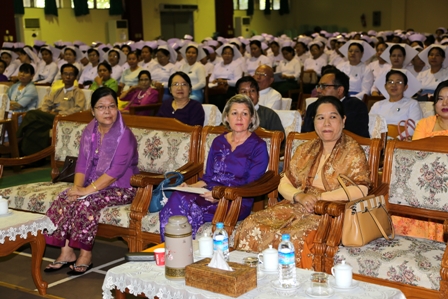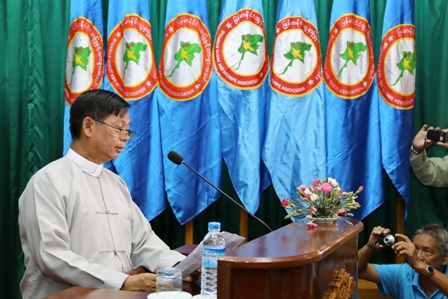The head of the United Nations Population Fund's (UNFPA) office in Myanmar praised the work and dedication of midwives at this year's International Day of the Midwife on Saturday (03 May 2014) in Yangon, adding their work provided the "backbone" of the country's health care system.
More than 400 midwives from all corners of Myanmar helped to mark the commemoration together with high-level dignitaries from the Ministry of Health, Myanmar Nurses and Midwife Association (MNMA) and UNFPA at the Nurses University in downtown Yangon under the heading “midwives changing the world one family at a time.” It was the second time that Myanmar marked this occasion.
In her address, Ms. Janet Jackson, UNFPA Myanmar Representative, said that “midwives deliver more than babies. They provide other life-saving reproductive health information and referral services, including antenatal, postnatal care and family planning. They are critical when it comes to obstetric care, knowing when it is needed.”
The need for midwives is as important as ever. With the support of UNFPA and in cooperation with the Myanmar Nurse and Midwife Association (MNMA) and the Ministry of Health (MoH), midwives are every day contributing to reducing maternal mortality which is still high in Myanmar, though it has gone down by 60% since 1990 to 200 maternal deaths per 100,000 live births.

Midwives are also pivotal to improving the quality of services of pregnant women, new mothers’ and newborns. In Myanmar there are currently only 1.3 health workers for every 1,000 people. This is less than the 2.3 standard advised by WHO. UNFPA is contributing US$207,514 a year to help train and deploy newly graduated midwives to areas where they are most needed.
Ms. Jackson, who herself started her career as a highly skilled midwife, emphasized that access to quality health care is a basic human right. “Every birth is a unique and magical moment for most.” She also stated that being a midwife by supporting a woman in sharing a precious and remarkable moment, was a privilege. “Midwives are at the front line to reduce maternal and neonatal mortality."
Yet, nearly 40 million women globally give birth every year without such support and care, increasing the risk of death and disability for both the mother and newborn. “Investment in midwives can help avert a significant number of the nearly 290,000 maternal deaths and three million newborn deaths that occur every year on a global scale due to the lack of well-educated and regulated health workers and adequate facilities. It is imperative that we continue boosting Myanmar’s role of the midwife through continuous education, expanding their role and scope of work, their presence, code of practice, protection through an updated legal framework, and deployment throughout the country, especially in rural areas,” she concluded.

Professor Daw Nang Htaw Hla, President of the Myanmar Nursing and Midwife Association said the purpose of celebrating the International Day of the Midwife "is to recognize and honour the role of midwifery." She highlighted that midwives play an important role in achieving Millennium Development Goals (MDG) 4: to Reduce Child Mortality and Goal 5: Improve Maternal Health. "Globally three million women and two million children still die due to complications and lack of access to skilled birth attendants... We must be committed and encourage midwives to continue working on improving the standards of services in Myanmar so that we can improve the health statues of all mothers and children."
At the commemoration, five midwives were presented with an award for their outstanding contribution in carrying out their duties. They each shared experiences with the audience on an event or success story which had made a real impression on them from their work. Daw Hla Kyi, 53 year-old midwife from Bago region and mother of four children herself, has been working as midwife for over 34 years. She said that for her working as a midwife in a rural community is very important. In her local community there is no doctor which means that she does more than just delivering babies. "Everything I do, I do with all of my heart and I help everyone living in my community," she said. She referred to an incident where she risked her life going to a non-government controlled area to help a mother in labour and where during the rainy season fighting had broken out. The expectant mother was from a Hindu family and had developed complications. Had Daw Hla Kyi not risked her own life and not gone to help with the delivery, the mother and the twin girls would have died. "I will never forget that night, I was very scared, but I still went and I am happy that I managed to save the life of the mother and her babies despite not having any tools, except soap, water and my bare hands."
The International Day of the Midwife is observed globally on 5 May 2014.


